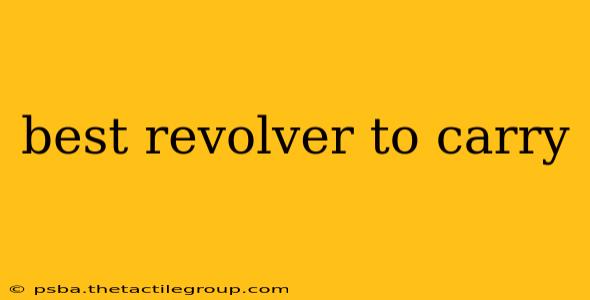Choosing the right revolver for concealed carry is a deeply personal decision, hinging on factors like hand size, shooting experience, and intended use. There's no single "best" revolver, but rather a range of excellent options that excel in different areas. This guide will explore key considerations and highlight several top contenders, helping you make an informed choice.
Key Considerations When Choosing a Carry Revolver
Before diving into specific models, let's address the crucial factors influencing your decision:
1. Caliber: Ballistics and Availability
The caliber you choose directly impacts the revolver's stopping power, recoil, and ammunition availability. Popular choices include:
- .38 Special: A classic round known for its manageable recoil and widespread availability. It offers a good balance of power and shootability.
- .357 Magnum: More powerful than .38 Special, offering increased stopping power but with significantly more recoil. This necessitates more practice and may be less comfortable for smaller-framed individuals.
- .22 LR: A significantly less powerful round, but it's lightweight, inexpensive to shoot, and boasts high ammunition capacity. Considered more suitable for self-defense in extreme close quarters or as a backup gun.
The choice depends on your comfort level with recoil and the intended purpose of the firearm.
2. Size and Weight: Concealability and Carry
Concealed carry demands a revolver that's compact and lightweight enough to be easily hidden and comfortably carried throughout the day. Smaller revolvers, like snubbies (2-inch barrels), are excellent for concealment but often compromise accuracy and sight radius. Larger revolvers, while offering better accuracy, might prove less convenient to conceal.
3. Action Type: Double-Action vs. Single-Action
- Double-Action (DA): The hammer is cocked and the firearm fired with a single trigger pull. This is generally preferred for concealed carry due to its faster draw and simplicity.
- Single-Action (SA): Requires manually cocking the hammer before each shot. While potentially more accurate, it's slower to use and less practical for self-defense situations. Many modern revolvers offer a double/single action configuration.
4. Features: Sights, Grips, and Reliability
Examine features crucial for effective shooting and comfortable carry:
- Sights: Good sights are vital for accurate shooting, especially in low-light conditions. Look for night sights or high-visibility options.
- Grips: Comfortable grips enhance control and reduce recoil. Consider grips made of rubber, wood, or other materials suited to your hand size and preference.
- Reliability: Choose a revolver known for its dependability and consistent function under pressure.
Top Revolver Choices for Concealed Carry
Several reputable manufacturers produce excellent revolvers suited for concealed carry. Here are a few examples, categorized by caliber:
.38 Special:
- Smith & Wesson Model 642: A lightweight, compact revolver known for its reliability and easy concealment.
- Ruger SP101: A more robust option offering greater durability.
.357 Magnum:
- Smith & Wesson Model 686 Plus: A larger, more powerful revolver, better suited for those comfortable with heavier recoil. Not ideal for deep concealment.
- Ruger GP100: Another robust and reliable option with a wider range of barrel lengths.
.22 LR:
- Smith & Wesson Model 317: A lightweight and easy-to-shoot revolver suitable as a backup or for less demanding self-defense scenarios.
- North American Arms Guardian: Extremely small and lightweight, though it compromises on power and shootability.
Conclusion: Making the Right Choice
Selecting the best revolver for concealed carry necessitates careful consideration of your individual needs and preferences. The information provided here serves as a starting point. Thorough research, handling different models, and potentially even professional shooting instruction will greatly aid in your decision-making process. Always prioritize safety and responsible firearm ownership. Remember to check your local and state laws regarding firearm ownership and concealed carry permits before purchasing any firearm.

